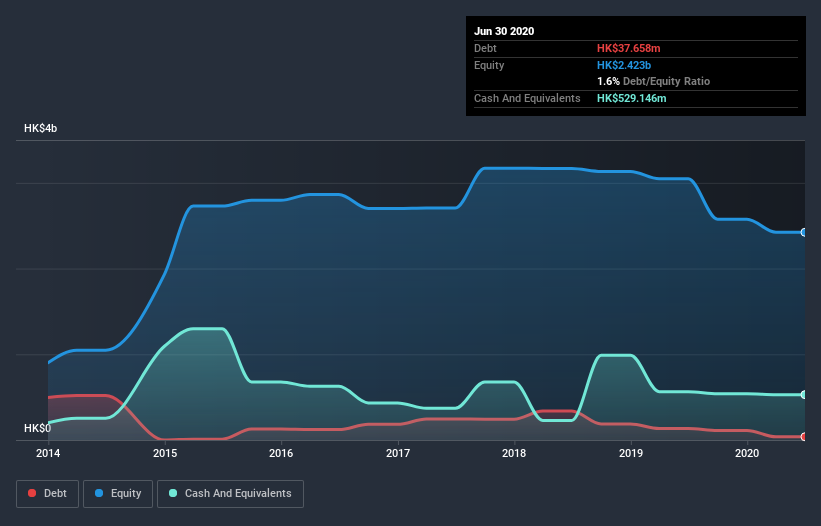- Hong Kong
- /
- Healthcare Services
- /
- SEHK:2389
Is Beijing Enterprises Medical and Health Industry Group (HKG:2389) Using Too Much Debt?

The external fund manager backed by Berkshire Hathaway's Charlie Munger, Li Lu, makes no bones about it when he says 'The biggest investment risk is not the volatility of prices, but whether you will suffer a permanent loss of capital.' So it seems the smart money knows that debt - which is usually involved in bankruptcies - is a very important factor, when you assess how risky a company is. We note that Beijing Enterprises Medical and Health Industry Group Limited (HKG:2389) does have debt on its balance sheet. But the real question is whether this debt is making the company risky.
When Is Debt A Problem?
Debt is a tool to help businesses grow, but if a business is incapable of paying off its lenders, then it exists at their mercy. Part and parcel of capitalism is the process of 'creative destruction' where failed businesses are mercilessly liquidated by their bankers. While that is not too common, we often do see indebted companies permanently diluting shareholders because lenders force them to raise capital at a distressed price. Of course, debt can be an important tool in businesses, particularly capital heavy businesses. The first step when considering a company's debt levels is to consider its cash and debt together.
Check out our latest analysis for Beijing Enterprises Medical and Health Industry Group
What Is Beijing Enterprises Medical and Health Industry Group's Debt?
The image below, which you can click on for greater detail, shows that Beijing Enterprises Medical and Health Industry Group had debt of HK$37.7m at the end of June 2020, a reduction from HK$134.6m over a year. However, it does have HK$529.1m in cash offsetting this, leading to net cash of HK$491.5m.

A Look At Beijing Enterprises Medical and Health Industry Group's Liabilities
According to the last reported balance sheet, Beijing Enterprises Medical and Health Industry Group had liabilities of HK$164.9m due within 12 months, and liabilities of HK$96.3m due beyond 12 months. Offsetting these obligations, it had cash of HK$529.1m as well as receivables valued at HK$136.3m due within 12 months. So it can boast HK$404.2m more liquid assets than total liabilities.
This luscious liquidity implies that Beijing Enterprises Medical and Health Industry Group's balance sheet is sturdy like a giant sequoia tree. Having regard to this fact, we think its balance sheet is just as strong as misogynists are weak. Simply put, the fact that Beijing Enterprises Medical and Health Industry Group has more cash than debt is arguably a good indication that it can manage its debt safely. There's no doubt that we learn most about debt from the balance sheet. But you can't view debt in total isolation; since Beijing Enterprises Medical and Health Industry Group will need earnings to service that debt. So if you're keen to discover more about its earnings, it might be worth checking out this graph of its long term earnings trend.
Over 12 months, Beijing Enterprises Medical and Health Industry Group reported revenue of HK$196m, which is a gain of 19%, although it did not report any earnings before interest and tax. That rate of growth is a bit slow for our taste, but it takes all types to make a world.
So How Risky Is Beijing Enterprises Medical and Health Industry Group?
By their very nature companies that are losing money are more risky than those with a long history of profitability. And we do note that Beijing Enterprises Medical and Health Industry Group had an earnings before interest and tax (EBIT) loss, over the last year. And over the same period it saw negative free cash outflow of HK$115m and booked a HK$438m accounting loss. Given it only has net cash of HK$491.5m, the company may need to raise more capital if it doesn't reach break-even soon. Overall, its balance sheet doesn't seem overly risky, at the moment, but we're always cautious until we see the positive free cash flow. When analysing debt levels, the balance sheet is the obvious place to start. However, not all investment risk resides within the balance sheet - far from it. To that end, you should learn about the 2 warning signs we've spotted with Beijing Enterprises Medical and Health Industry Group (including 1 which is can't be ignored) .
Of course, if you're the type of investor who prefers buying stocks without the burden of debt, then don't hesitate to discover our exclusive list of net cash growth stocks, today.
If you decide to trade Beijing Enterprises Medical and Health Industry Group, use the lowest-cost* platform that is rated #1 Overall by Barron’s, Interactive Brokers. Trade stocks, options, futures, forex, bonds and funds on 135 markets, all from a single integrated account. Promoted
If you're looking to trade Beijing Health (Holdings), open an account with the lowest-cost platform trusted by professionals, Interactive Brokers.
With clients in over 200 countries and territories, and access to 160 markets, IBKR lets you trade stocks, options, futures, forex, bonds and funds from a single integrated account.
Enjoy no hidden fees, no account minimums, and FX conversion rates as low as 0.03%, far better than what most brokers offer.
Sponsored ContentValuation is complex, but we're here to simplify it.
Discover if Beijing Health (Holdings) might be undervalued or overvalued with our detailed analysis, featuring fair value estimates, potential risks, dividends, insider trades, and its financial condition.
Access Free AnalysisThis article by Simply Wall St is general in nature. It does not constitute a recommendation to buy or sell any stock, and does not take account of your objectives, or your financial situation. We aim to bring you long-term focused analysis driven by fundamental data. Note that our analysis may not factor in the latest price-sensitive company announcements or qualitative material. Simply Wall St has no position in any stocks mentioned.
*Interactive Brokers Rated Lowest Cost Broker by StockBrokers.com Annual Online Review 2020
Have feedback on this article? Concerned about the content? Get in touch with us directly. Alternatively, email editorial-team@simplywallst.com.
About SEHK:2389
Beijing Health (Holdings)
An investment holding company, provides medical, health, and geriatric care related services and products in the People’s Republic of China.
Flawless balance sheet minimal.
Market Insights
Community Narratives




